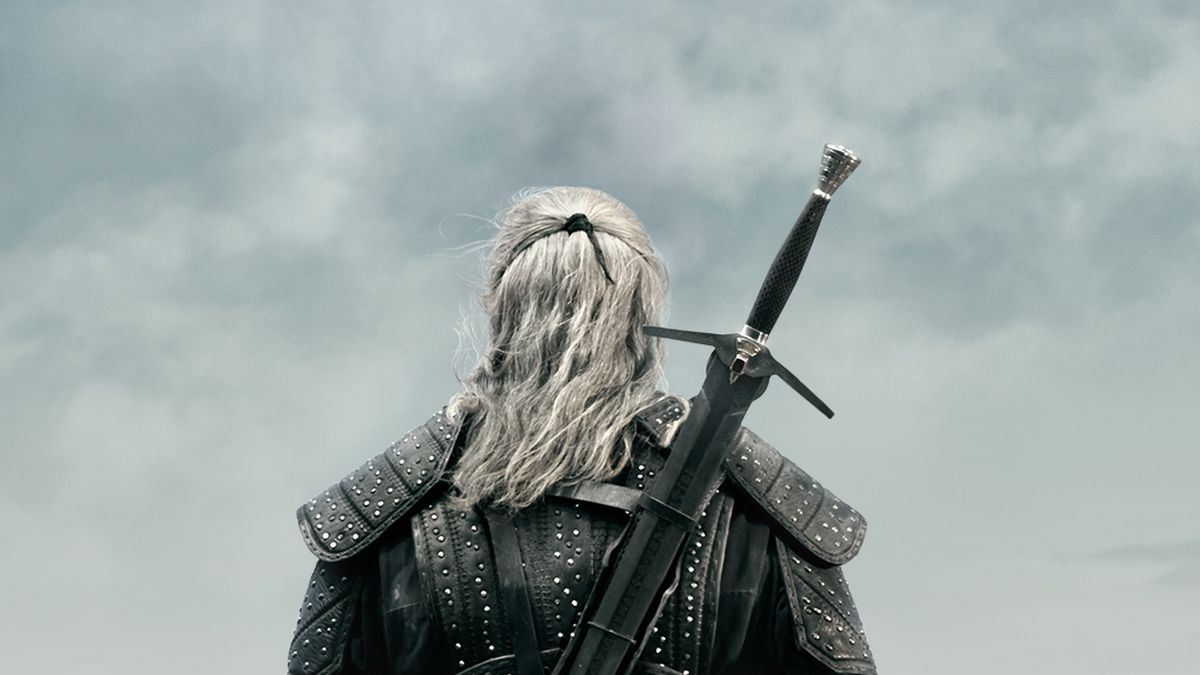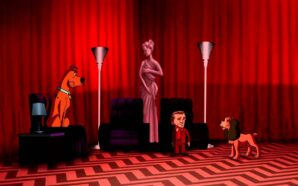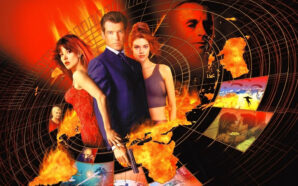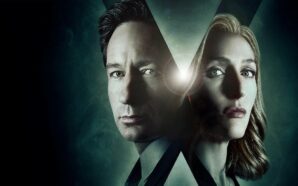I like liking things. Unlike many on the Internet I get no pleasure from complaining about movies, TV shows or video games I dislike, but rather I choose to celebrate what I do enjoy. This mindset has made watching the first season of The Witcher – Netflix’s fantasy adaptation series aimed to rival Game of Thrones – a frustrating experience. It’s a show I desperately want to like, to celebrate, but every time I get close to fully enjoying the series it throws something at me that resets my entertainment level back down to zero. Despite being only eight episodes – or maybe because of that – the season was a struggle to finish and when it concluded I was left feeling unsatisfied. So, where did it go wrong? How did a show that I should have hungrily lapped up ultimately leave me cold?
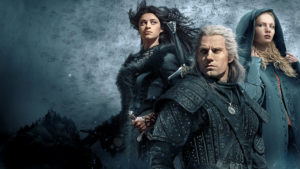 Before we get into my issues with the series, let’s look at what I do enjoy about the show and therefore why, when problems do arise, the disappointment was doubled. I really like the basic concept of the series and the themes it presents. Our protagonist Geralt – the titular Witcher – is a monster hunter, seen as a monster himself, but the real monsters are often the humans who hire him. His journey is all about the actions he takes that could either enforce or contradict the view humans have of him that he is a monster because of his very nature, something that also echoes through dual protagonist Yennefer’s storyline. Ultimately the series is about two sterile people brought together by destiny to help a child and find companionship with each other in a harsh world. In a world so clearly full of magic, does destiny and fate truly exist? This question too is something the season grapples with and the exploration of this fantasy trope is probably my favourite aspect of the series. Is destiny real, or is it that if you choose to believe in it then that’s all you see? Is Geralt really tied to Ciri or is the mere fact that he thinks he is what makes him return to Cintra? I love these questions the series poses.
Before we get into my issues with the series, let’s look at what I do enjoy about the show and therefore why, when problems do arise, the disappointment was doubled. I really like the basic concept of the series and the themes it presents. Our protagonist Geralt – the titular Witcher – is a monster hunter, seen as a monster himself, but the real monsters are often the humans who hire him. His journey is all about the actions he takes that could either enforce or contradict the view humans have of him that he is a monster because of his very nature, something that also echoes through dual protagonist Yennefer’s storyline. Ultimately the series is about two sterile people brought together by destiny to help a child and find companionship with each other in a harsh world. In a world so clearly full of magic, does destiny and fate truly exist? This question too is something the season grapples with and the exploration of this fantasy trope is probably my favourite aspect of the series. Is destiny real, or is it that if you choose to believe in it then that’s all you see? Is Geralt really tied to Ciri or is the mere fact that he thinks he is what makes him return to Cintra? I love these questions the series poses.
I also love the world of The Witcher. At least I think I do. I’m wilfully ignorant of the books the series is based on, and the video game sequels, because I believe the show needs to standalone for Witcher novices like myself. I’m a sucker for fantasy worlds and histories, priding myself on vast knowledge of The Lord of the Rings and A Song of Ice and Fire, so I’m always open to add another tome to my mental library, and what I’ve seen of The Witcher intrigues me. It also confuses me. The first season really does make you appreciate the first season of Game of Thrones so much for how it balanced intimate character drama with explaining the complex world at an understandable pace. The Witcher is a bit all over the place in that regard, and while I know the names of several regions and some basic history and lore, it all feels separate and incohesive. I don’t have a good sense of the Continent at large and I could really have used a glimpse of a map, something Game of Thrones ingeniously used in its opening credits.
So, truth is, I think I like this world and the narrative being told within. I just don’t like the way it’s being told. Confusingly, the first season is set over three timelines that are progressing at three different rates, from decades to just weeks, before they all hit the same point of time at the season’s end. It’s certainly a novel way to tell the story but it reeks of ambition gone awry. I am intrigued by this narrative concept and I love shows like Westworld that offer complex and convoluted timelines to piece together, shows that take effort to appreciate, but this just didn’t work for me. It feels as if it was clearly used just to try and get all this character backstory out of the way quickly so they could begin telling the actual story next season, but these character journeys aren’t something you can just gloss over.
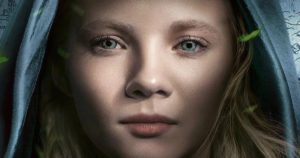 I like the context clues we receive along the way so we can start to piece the different storylines into one cohesive timeline but there needed to be more of them. For example, at what point in the Yennefer storyline did Stregobor go into hiding like we see him in Geralt’s storyline in episode 1? I really needed a mention of that in Yennefer’s time frame to gel the two together. All this time hopping also brings up the question of aging. I guess magic conveniently slows the aging process meaning Geralt, Yennefer and all the mages can remain looking as beautiful as they do for decades, if not centuries, but what about Jaskier? Geralt’s scenes with him must take place decades apart but he looks no different. And Ciri is supposed to be 12?! The actress is quite clearly older (18) and her playing a 12-year-old is preposterous, especially after seeing a young Arya in Game of Thrones.
I like the context clues we receive along the way so we can start to piece the different storylines into one cohesive timeline but there needed to be more of them. For example, at what point in the Yennefer storyline did Stregobor go into hiding like we see him in Geralt’s storyline in episode 1? I really needed a mention of that in Yennefer’s time frame to gel the two together. All this time hopping also brings up the question of aging. I guess magic conveniently slows the aging process meaning Geralt, Yennefer and all the mages can remain looking as beautiful as they do for decades, if not centuries, but what about Jaskier? Geralt’s scenes with him must take place decades apart but he looks no different. And Ciri is supposed to be 12?! The actress is quite clearly older (18) and her playing a 12-year-old is preposterous, especially after seeing a young Arya in Game of Thrones.
Rather than an adaptation of the books, the series feels like an adaptation of the cliff notes. I do quite enjoy the standalone short story-style nature of most episodes, at least in concept, but we really needed to see some of things that happened between episodes. Geralt doesn’t seem to change that much but Yennefer changes drastically every time we see her. Her character arc is vast and highly important and so we actually need to witness her growth, but the show just gives us all too brief glimpses at different parts of her life and the change happens offscreen for the most part. She spends two episodes hoping to go to court as a mage influencer to a King but the next episode is set years later and she’s tired of court. For this to work I actually need to see her at court rather than being told that’s what she wants and then next episode that she doesn’t want it anymore. Show me the realisation and growth, don’t just have her monologue about it retrospectively. That’s not storytelling!
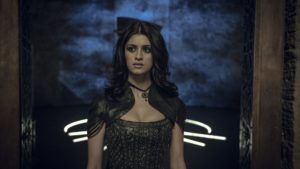 I also definitely needed to see Geralt and Yennefer meet several times between episodes 4 and 5. I need to spend time with these characters to believe that Geralt would choose to tie their fates together forever using magic. As it stands, I don’t buy it. They spend about 20 minutes together, have sex, and suddenly Geralt wants to be with her forever. And we don’t get a good idea of how their lives are forever connected because next time they meet in the series they only briefly mention that they’ve met up a few times between episodes. I need to see that! The characters being tied together by destiny is what needs to happen for the plot but adaptations need to do more than simply retell events from the books. I need to get to know these characters, and the thoughts in character’s heads from the books are vital to understand what they think and feel. That’s naturally absent from the storytelling medium of television so those ideas need to be turned into scenes. I just don’t buy their relationship, and the entire show hinges upon it. Geralt has better chemistry with Renfri in their limited screen time in one episode than with Yennefer over the whole season and that’s a massive problem.
I also definitely needed to see Geralt and Yennefer meet several times between episodes 4 and 5. I need to spend time with these characters to believe that Geralt would choose to tie their fates together forever using magic. As it stands, I don’t buy it. They spend about 20 minutes together, have sex, and suddenly Geralt wants to be with her forever. And we don’t get a good idea of how their lives are forever connected because next time they meet in the series they only briefly mention that they’ve met up a few times between episodes. I need to see that! The characters being tied together by destiny is what needs to happen for the plot but adaptations need to do more than simply retell events from the books. I need to get to know these characters, and the thoughts in character’s heads from the books are vital to understand what they think and feel. That’s naturally absent from the storytelling medium of television so those ideas need to be turned into scenes. I just don’t buy their relationship, and the entire show hinges upon it. Geralt has better chemistry with Renfri in their limited screen time in one episode than with Yennefer over the whole season and that’s a massive problem.
While Geralt’s storyline is very anthological and fits well with the show’s structure, Yennefer’s is totally serialised and doesn’t fit the show at all. In its current format, the series feels at odds with itself. The biggest problem is just how much narrative and character progression they’re trying to squeeze into the very limited space of 8 episodes. We learn that Yennefer has lived 2 or 3 lifetimes but hasn’t been satisfied with any of them. Those 2 or 3 lifetimes are 2 or 3 seasons worth of storylines, not the 7 episodes we get her in. Her storyline is a huge rush but by comparison Geralt’s is lethargic. He just wanders the land hunting monsters. When it’s done it right it ties in thematically with what’s going on with Yennefer or explores his relationship with destiny, but too often it feels aimless. I never really got a good sense of who Geralt is, other than a tough guy with a deep voice that makes me laugh. His voice really needs to soften a little; he sounds like Star Lord trying to copy Thor’s voice in Infinity War. The Witcher truly is Yennefer’s show and that’s not necessarily a bad thing. She’s definitely the most interesting character and Anya Chalotra is a wonderful actress.
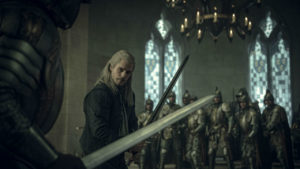 I’ve spoken of my love for the exploration of the nature of destiny in show but I’m not completely onboard with the ‘Law of Surprise’. As far as I can gather, in the world of The Witcher there is an arcane law that says that if you save someone’s life you can enact the Law of Surprise, which grants them with the thing the person they saved has but doesn’t know they have. For some reason this is almost always a child, but why so many people have children they don’t know of is beyond me. It’s fittingly recondite for the world I guess but I’m not sure if I like what the law brings to the story. Or at least how it’s presented/explained in the show. Which is terribly, by the way. I had to Google it to understand what was actually happening. At one-point Geralt enacts the law, foolishly as a joke, and at that moment the Princess he saved vomits meaning she’s pregnant and he has ownership over the child. I’m sorry but how does everyone jump to the conclusion that she’s pregnant the second she vomits? She was just in a bloody battle minutes beforehand which ended with her using unknown magical powers to lift herself into the air in a whirl of CGI. I’m pretty sure I would vomit after that. And years later, when returning to claim the child, Geralt is fooled by a fake child for all of 90 seconds before he just happens to stumble across the real one. Is that the exploration of destiny or just bad writing?
I’ve spoken of my love for the exploration of the nature of destiny in show but I’m not completely onboard with the ‘Law of Surprise’. As far as I can gather, in the world of The Witcher there is an arcane law that says that if you save someone’s life you can enact the Law of Surprise, which grants them with the thing the person they saved has but doesn’t know they have. For some reason this is almost always a child, but why so many people have children they don’t know of is beyond me. It’s fittingly recondite for the world I guess but I’m not sure if I like what the law brings to the story. Or at least how it’s presented/explained in the show. Which is terribly, by the way. I had to Google it to understand what was actually happening. At one-point Geralt enacts the law, foolishly as a joke, and at that moment the Princess he saved vomits meaning she’s pregnant and he has ownership over the child. I’m sorry but how does everyone jump to the conclusion that she’s pregnant the second she vomits? She was just in a bloody battle minutes beforehand which ended with her using unknown magical powers to lift herself into the air in a whirl of CGI. I’m pretty sure I would vomit after that. And years later, when returning to claim the child, Geralt is fooled by a fake child for all of 90 seconds before he just happens to stumble across the real one. Is that the exploration of destiny or just bad writing?
Another major issue with the season is the villains: the kingdom of Nilfgaard. I know people are complaining about their bizarre wrinkly armour but that’s the least of their issues. What’s their motive? They’re mocked by Cintra so is that the inciting incident for them to build an army and invade the north? That’s painfully simple and uninteresting, especially for a series following up the political intricacies of Game of Thrones. It seems they recruit civilians to their cause as they invade and there’s a mention of them giving people what they want. I don’t know what that means but it could be interesting if they ever actually explored what Nilfgaard itself wants. They want Ciri for some unexplained reason. The face of Nilfgaard in the show is Cahir, a truly dull villain who we know absolutely nothing about. Which is a shame because the actor – Eamon Farren – was wonderfully terrifying as Richard Horne in Twin Peaks. Is he the true leader or just a commander in charge of the army? Everything is so ill defined. Fringilla too is a fairly nothing character. Why is she bad? No idea. I even forgot that she was one of the mages we saw at the school in the early episodes she’s that unmemorable.
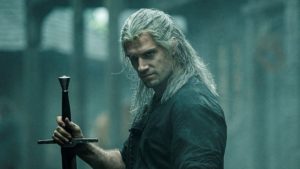 Looking at the season overall, I think the first 3 episodes are the best. They certainly have problems but they build in quality and begin to set up where Yennefer and Geralt’s journeys will take them. From that point on the series gets worse as the timeline jumps get larger and character development judders rather than flows. Despite its many flaws, I did enjoy the season finale, particularly the battle of magic between Fringilla and the rogue mages. Although Geralt does nothing but sit in the back of a cart for almost the entire episode, having terrible dreams of his mother. He’s bitten by an unnecessary monster that comes out of nowhere for no other reason than to take him off the board until the final scene. Sadly, the writing of the show is often this weak and apparent. I do look forward to seeing where the show goes in the second season, hopefully with a focus on this bizarre family unit and a more linear tale. But before I see what’s next, I think I’m going to have to rewatch the first season. Not out of enjoyment but rather to try and further untangle this twisted web of convoluted storytelling.
Looking at the season overall, I think the first 3 episodes are the best. They certainly have problems but they build in quality and begin to set up where Yennefer and Geralt’s journeys will take them. From that point on the series gets worse as the timeline jumps get larger and character development judders rather than flows. Despite its many flaws, I did enjoy the season finale, particularly the battle of magic between Fringilla and the rogue mages. Although Geralt does nothing but sit in the back of a cart for almost the entire episode, having terrible dreams of his mother. He’s bitten by an unnecessary monster that comes out of nowhere for no other reason than to take him off the board until the final scene. Sadly, the writing of the show is often this weak and apparent. I do look forward to seeing where the show goes in the second season, hopefully with a focus on this bizarre family unit and a more linear tale. But before I see what’s next, I think I’m going to have to rewatch the first season. Not out of enjoyment but rather to try and further untangle this twisted web of convoluted storytelling.
The season ends with two characters who don’t know each other embracing and, in truth, the audience doesn’t know them either. And that’s the true frustration with the season. For everything it does and tries to do, at the end of the 8 episodes I still feel nothing for these characters. Do you feel the same? Are you more positive about The Witcher’s first season than me? Let me know in the comments and be sure to geek out with me about TV, movies and video-games on Twitter @kylebrrtt.




